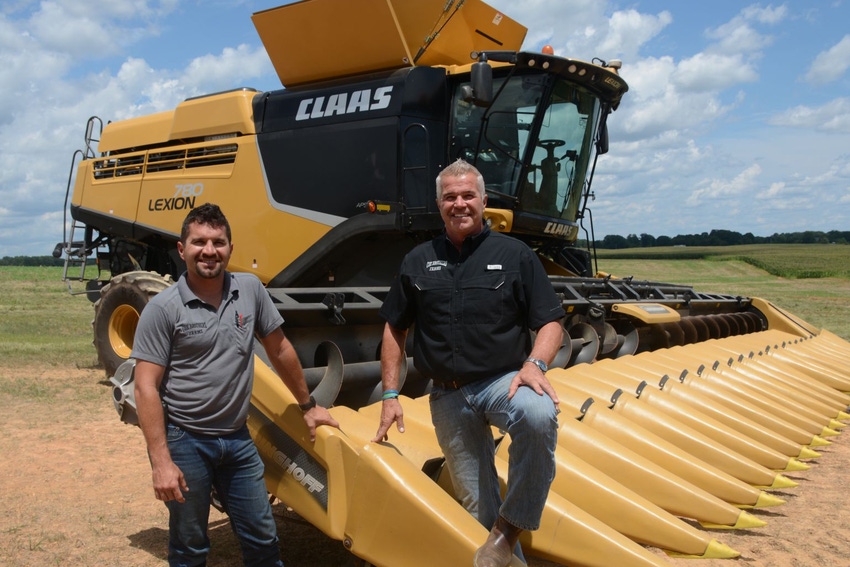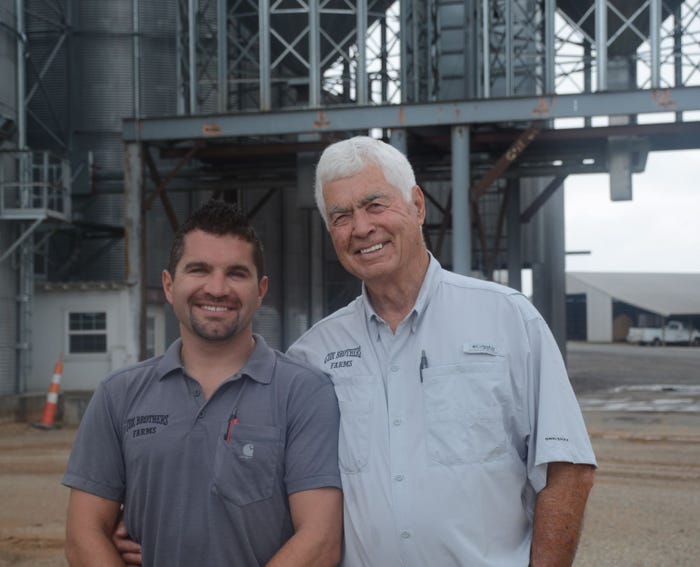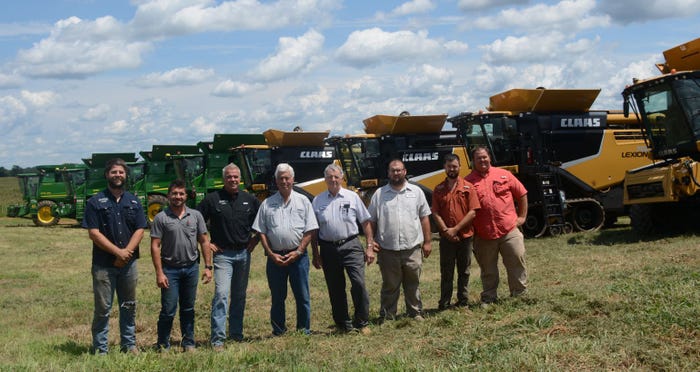
It all began in 1962 when Marion Cox paid $8,000 for 75 acres of farmland near Monroe in Union County. That was the launch for what would become a large, diversified North Carolina family farm that is well known for both its stewardship and productivity.
“We continued to buy land as we could afford it. We would clear the land and make farm land out of it,” Marion said.
Today, Cox Brothers Farms spans more than 15,000 acres in North Carolina’s Southern Piedmont, producing corn, soybeans and wheat as well as 3 million broilers per year and 50,000 hogs per year. Marion Cox is still actively involved in the operation as is his brother Bobby Cox, especially at harvest time when both will operate combines.
Cox Brothers Farms is a true family farm. Marion’s son Rusty manages the day-to-day farm operations along with his son Campbell. Campbell also manages the 1.400 sow farrow-to-finish hog operation. Bobby’s grandson Logan Watson manages the chicken operation and the soil fertility program for all three crops. Another grandson of Bobby’s, Jordan Cox, manages the poultry litter, cleanout, storage and application operation of more than 38,000 tons per year.
Marion’s wife Delano is also actively involved in the operation, managing the books, a job she has done since Marin began farming. “She keeps a close watch on every dollar we spent. Nothing gets buy her,” grandson Campbell says. “It is rare for a farmer’s wife to be so actively involved. Everything from parts bills to grains contracts cross her desk to this day.”
The family produces 4,000 acres of corn, 11,000 to 12,000 acres of soybeans and 6,000 to 8,000 acres of wheat. “A quarter million bushels per year of our corn goes back into feeding our own hogs and the rest is marketed. Soybeans and wheat are normally marketed to ADM,” notes Rusty.
All of the acreage is dryland which makes close management all the more important. “There is no water here so we can’t irrigate,” Rusty says. Because of that, the family looks to varieties that perform best without irrigation.
“We will test a variety three years before we are comfortable to make it a huge portion of our acreage. We test every year. We compare varieties against the varieties that we know perform every year,” Rusty explains.
Rusty and Campbell determine crop rotation and continuously adjust their chemical portfolio as needed. “This begins with variety, trait and management program trials year after year. We then purchase all seed and chemicals needed to fit the ever changing conditions,” Campbell explains.
“Half of our soybean crop is dicamba tolerant and the other half is Roundup Ready. We try to choose varieties that fit our program, our soils and our weather. It took years to find the Roundup Ready varieties that really excelled on our farm. We try to find the exact varieties that work best for us,” Rusty says. “Every farm has different farming practices, different management practices and different soils. Finding the right variety that fits our operation takes a lot of testing.”
Campbell adds that it is vital to be both progressive and proactive in both variety selection and input selection.
“You can miss out on a variety for one year and be five steps behind the next year,” he says. “The first step for failure is being stagnant. You have to be progressive all the time and test what’s new. This is true for all of the new products coming down the pipeline from varieties to chemicals. You have to test all of these. If you don’t you will be left behind very quickly.”
Rusty puts it this way: “Success depends on management, intensive management.”
Marketing is vital for the operation. The family turns to Edgar Woods and Palmetto Grain Brokerage for help on making informative marketing decision. Rusty is in charge of marketing all of wheat and corn while Marion markets all of the soybeans. “That’s a job in itself,” Rusty adds.
Since North Carolina is a grain deficit state, finding a home for the soybeans, corn and wheat is not a problem.
“There are two mills in Charlotte and Newton that use all of our wheat while ADM utilizes all of our soybeans in Kershaw, S.C. ... Corn is eaten up by several turkey and chicken operations right here near us,” Rusty explains.
On-farm grain storage is vital. “One of the biggest marketing strategies for us is grain bins. We store a huge portion of our crop for a later marketing strategy. Holding the crop later allows you to get away from the harvest pressures,” says Rusty...
A key management strategy is for Rusty and Campbell to run the sprayers themselves. This approach is all the more important for the family this year since they are using BASF’s Engenia herbicide on their dicamba-tolerant soybeans.
“A lot of the larger farmers ask us why we spray our own crops. We tell them that we can better manage our crops when we’re on a sprayer. If you’re on a sprayer going down the field, you feel confident that you’re getting the best management done,” Rusty says.” You can’t see it from a pick-up truck riding down the road and see what you need to do in that field. If you circle it with a sprayer, you will know immediately if you need to change up your strategy in that particular field or not.”
Rusty says what started out as his father’s dream has become a three-generation family business. “Ten family members and about 25 other team members are involved in the operations and we are hoping for continued growth and success,” Rusty says.

Marion Cox and grandson Campbell Cox
Campbell Cox and grandfather Marion Cox

Family members involved in the operation include Cramer Phillips, Campbell Cox, Rusty Cox, Marion Cox, Bobby Cox, Grayson Watson, Jordan Cox and Logan Watson.
Family members involved in the operation include Cramer Phillips, Campbell Cox, Rusty Cox, Marion Cox, Bobby Cox, Grayson Watson, Jordan Cox and Logan Watson.
About the Author(s)
You May Also Like






